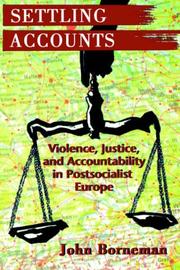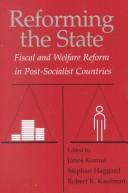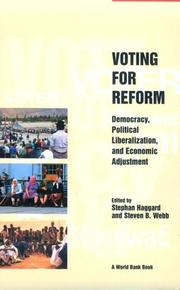| Listing 1 - 5 of 5 |
Sort by
|
Book
ISBN: 0821387421 9786613066091 1283066092 082138743X Year: 2011 Publisher: Washington, D.C. : World Bank,
Abstract | Keywords | Export | Availability | Bookmark
 Loading...
Loading...Choose an application
- Reference Manager
- EndNote
- RefWorks (Direct export to RefWorks)
The financial crisis, which began in the United States and Western Europe swiftly expanded into an economic crisis throughout developing countries. The Eastern Europe and Central Asia region was hit harder than any other region in the world. Deteriorating macroeconomic conditions led to deteriorating household welfare, as unemployment increased. Those workers who kept their jobs took home smaller paychecks. Men became more highly represented among the unemployed, and youth struggled to secure their first job.Confronted by an income shock, families tried two strategies. First, families took ste
Europe, Eastern --Social policy. --- Manpower policy --Europe, Eastern. --- Recessions --Europe, Eastern. --- Manpower policy --- Recessions --- Business & Economics --- Labor & Workers' Economics --- Europe, Eastern --- Social policy. --- Business cycles --- Depressions --- Employment policy --- Human resource development --- Labor market --- Labor market policy --- Manpower utilization --- Labor policy --- Labor supply --- Trade adjustment assistance --- Government policy
Book
ISBN: 1464805423 1464805393 Year: 2015 Publisher: Washington, D.C., The World Bank,
Abstract | Keywords | Export | Availability | Bookmark
 Loading...
Loading...Choose an application
- Reference Manager
- EndNote
- RefWorks (Direct export to RefWorks)
"Portraits of Labor Market Exclusion presents ""profiles"" or ""portraits"" of individuals who have limited labor-market attachment. It is widely accepted that those with limited attachment to the labor market are a highly heterogeneous group (including, for instance, recent job losers, long-term unemployed, school leavers with no labor-market experience, those close to retirement age, or people with caring responsibilities), and that understanding their circumstances and potential barriers is an essential prerequisite for designing and implementing a tailored and effective mix of policy support and incentives. The report takes a comprehensive view, focusing on both the labor market attachment of a country's out-of-work population and the social assistance package and poverty profile of the same segment of the population. In essence, the report looks at individuals through the lenses of both poverty/welfare status and labor market indicators, and, in doing so, the portraits helps move the dialogue from a purely labor market-centric view to a broader dialogue that includes social policy as a whole. This is an important shift; for instance, social protection programs, such as family benefits and maternity benefits, and broader social policy issues such as retirement ages, often have a great impact on who remains inactive. Specifically, the report presents portraits of the out-of-work population of six countries (Bulgaria, Estonia, Greece, Hungary, Lithuania and Romania) in terms of distance from the labor market, human capital, and labor supply conditions, as well as demographic conditions. The analysis relies on the European Union Statistics of Income and Living Conditions (EU-SILC) surveys for the years 2007 to 2011. Latent class analysis methodology allows multidimensional profiling of the out-of-work population, and identifies classes or groups of out-of-work individuals that are as homogeneous as possible within each class according to a set of observable characteristics, and as distant as possible between classes. Consequently, this analysis provide a much richer glimpse of the very different barriers to labor market integration that these various groups experience, considerably augmenting the limited amount of information contained in traditional descriptive statistics."
Europe, Eastern -- Social policy. --- Labor market -- Europe, Eastern. --- Unemployed -- Europe, Eastern. --- Labor market --- Unemployed --- Commerce --- Business & Economics --- Marketing & Sales --- Personnel management --- Sustainable development --- Research. --- Planning. --- Development, Sustainable --- Ecologically sustainable development --- Economic development, Sustainable --- Economic sustainability --- ESD (Ecologically sustainable development) --- Smart growth --- Sustainable economic development --- Personnel research --- Environmental aspects --- Economic development --- Europe, Eastern --- Europe, Eastern. --- Social policy. --- East Europe

ISBN: 1400822343 9786612753299 1282753290 1400811090 9781400811090 9781400822348 9780691016818 069101681X 9780691016825 0691016828 0691016828 069101681X Year: 1997 Publisher: Princeton (N.J.): Princeton university press,
Abstract | Keywords | Export | Availability | Bookmark
 Loading...
Loading...Choose an application
- Reference Manager
- EndNote
- RefWorks (Direct export to RefWorks)
As new states in the former East bloc begin to reckon with their criminal pasts in the years following a revolutionary change of regimes, a basic pattern emerges: In those states where some form of retributive justice has been publicly enacted, there has generally been much less of a recourse to collective retributive violence. In "Settling Accounts", John Borneman explores the attempts by these aspiring democratic states to invoke the principles of the 'rule of law' as a means of achieving retributive justice, that is, convicting wrongdoers and restoring dignity to victims of moral injuries. Democratic regimes, Borneman maintains, require a strict form of accountability that holds leaders responsible for acts of criminality.This accountability is embodied in the principles of the rule of law, and retribution is at the moral center of these principles. Drawing from his ethnographic work in the former East Germany and with select comparisons to other East-Central European states, Borneman critically examines the construction of categories of criminality. He argues against the claims that economic growth, liberal democracy, or acts of reconciliation are adequate means to legitimate the transformed East bloc states. The cycles of violence in states lacking a system of retributive justice help to support this claim. Invocation of the principles of the rule of law must be seen as a chance for a more democratic, more accountable, and less violent world.
Social justice --- Retribution. --- Political crimes and offenses --- Reparation (Criminal justice) --- Rule of law --- Post-communism --- Equality --- Justice --- Social exchange --- Punishment --- Revenge --- Offenses against the State --- Offenses, Political --- Political offenses --- State, Offenses against the --- Crime --- Extradition --- Political violence --- Subversive activities --- Compensation for victims of crime --- Criminal restitution --- Reparation --- Restitution (Criminal justice) --- Restitution for victims of crime --- Remedies (Law) --- Supremacy of law --- Administrative law --- Constitutional law --- Europe, Eastern --- Politics and government --- Social policy. --- Retribution --- Social policy --- Post-communism - Europe, Eastern --- Rule of law - Europe, Eastern --- Reparation (Criminal justice) - Europe, Eastern --- Political crimes and offenses - Europe, Eastern --- Social justice - Europe, Eastern --- Europe, Eastern - Social policy --- Europe, Eastern - Politics and government - 1989 --- -Social justice --- -Post-communism

ISBN: 0521774888 0521773016 1139175297 9780521773010 9780521774888 9781139175296 Year: 2001 Publisher: Cambridge: Cambridge university press,
Abstract | Keywords | Export | Availability | Bookmark
 Loading...
Loading...Choose an application
- Reference Manager
- EndNote
- RefWorks (Direct export to RefWorks)
Countries of the former Soviet Union and Eastern Europe are entering the second decade of political transformation and economic reform. The first decade involved macroeconomic stabilization, privatization, and development of the basic institutional infrastructure of a market economy. The new policy challenges center on the nature of the social contract between citizens and their governments. These challenges include identifying the appropriate boundaries between the obligations of the public sector and the responsibilities of individual citizens, the range of public goods the government should supply, and who should pay for and benefit from their provision. The essays in this volume, first published in 2001, focus on two interrelated issues: the making of fiscal policy and the provision of citizens' welfare, particularly regarding pensions and health care. The essays emphasize that there is no single model of a market economy; rather, governments and publics face a range of options for restructuring the socialist welfare state.
Hungary --- Economic order --- Social policy --- Tax law --- Eastern and Central Europe --- Europe, Eastern --- Russia (Federation) --- Social policy. --- Business, Economy and Management --- Economics --- Dēmokratia tēs Oungarias --- Gweriniaeth Hwngari --- Hanekeria --- Hangarī --- Hongaarse Republiek --- Hongaria --- Hongarije --- Hongarye --- Hŏnggari --- Hongria --- Hongrie --- Honharije --- Hunakalia --- Hungara Respubliko --- Hungari --- Hungaria --- Hungariako Errepublika --- Hungarian Republic --- Hungariar Errepublika --- Hungario --- Hungarujo --- Hungaryah --- Hungría --- Hungrii --- Hwngari --- Jamhuri ya Hungaria --- Lepulika o Hungary --- Lýðveldið Ungverjaland --- Macaristan --- Macaristan Cumhuriyeti --- Macarıstan Respublikası --- Mađarska --- Mad̕arská republika --- Maďarsko --- Madi︠a︡rshchyna --- Madjaristan --- Madžarska --- Madźary --- Madzhar --- Madzhar Respublika --- Magyar Köztársaság (Republic) --- Magyar Népköztársaság --- Magyar Republic --- Magyar Tanácsköztársaság --- Magyarország (Republic) --- Majarstan Jȯmḣu̇rii︠a︡te --- Majoriston --- Mazharstan --- Mazharstan Respublikasy --- Ohorsʹka Respublika --- Ongaria --- Ongiri --- Ongria --- Oonguri --- Oungaria --- Oгорська Республіка --- Pobblaght ny h-Ungaar --- Poblacht na hUngáire --- Republic of Hungary --- República da Hungria --- República de Hungría --- República d'Hongria --- Republica d'Ongria --- Republica Ungară --- Republica Ungaria --- Republica Ungrese --- Republiek van Hongarye --- Republik bu Oonguri --- Republik Hongaria --- Republik Ungarn --- Republika e Hungarisë --- Republika Mađarska --- Republika Madžarska --- Republika ng Unggarya --- Republika Ungarija --- Republika Węgierska --- Republikang Unggaro --- Republiken Ungern --- Republikken Ungarn --- République de Hongrie --- Repúvlika de Madjaristan --- Respublica Hungarica --- Tjóðveldið Ungarn --- Tlācatlahtohcāyōtl Hungria --- Uhorshchyna --- Uhorsʹka Respublika --- Ungaar --- Ungaïa --- Ungáir --- Ungar --- Ungari --- Ungari Vabariik --- Ungaria --- Ungarii︠a︡ --- Ungārija --- Ungārijas Republika --- Ungarn --- Ungarskata republika --- Ungerija --- Ungern --- Unggarya --- Unggriya --- Ungheria --- Unghirìa --- Ungri --- Ungverjaland --- Unkari --- Unkarin tasavalta --- V.N.R. --- Vengerskai︠a︡ Narodnai︠a︡ Respublika --- Vengerskai︠a︡ Respublika --- Vengrėjė --- Vengrėjės Respoblėka --- Vengrii︠a︡ --- Vengrii︠a︡ Respublikasy --- Vengrija --- Vengrijos respublika --- Vengriya --- Vengriya Respublikasi --- Venhryi︠a︡ --- VNR --- Węgry --- Xiongyali --- Xiongyali gong he guo --- Xiongyali Gongheguo --- Ουγγαρία --- Δημοκρατία της Ουγγαρίας --- Република Унгарија --- Република Мађарска --- Унгар --- Унгарската република --- Унгария --- Унгарија --- Угорська Республіка --- Угорщина --- Мажарстан --- Мажарстан Республикасы --- Мађарска --- Мадярщина --- Маджар --- Маджар Республика --- Венгрыя --- Венгрия --- Венгрия Республикасы --- Венгерская Республика --- אונגארן --- רפובליקא דא מאגיאדיסטאן --- מאגיאדיסטאן --- הונגריה --- ハンガリー --- 匈牙利 --- 匈牙利共和國 --- 헝가리 --- Austro-Hungarian Monarchy --- Europe, Eastern - Social policy. --- Russia (Federation) - Social policy. --- Hungary - Social policy. --- BNUU --- БНУУ --- Bu̇gd Naĭramdakh Ungar Uls

ISBN: 0195209877 0195209982 Year: 1994 Publisher: Oxford : Oxford university press,
Abstract | Keywords | Export | Availability | Bookmark
 Loading...
Loading...Choose an application
- Reference Manager
- EndNote
- RefWorks (Direct export to RefWorks)
338.24 --- 336.1 --- 35.078 --- 35.078 Vormen van overheidsbemoeing. Opheffing van overheidstussenkomst. Privatisering --- Vormen van overheidsbemoeing. Opheffing van overheidstussenkomst. Privatisering --- 336.1 Public finance, government finance in general --- Public finance, government finance in general --- 338.24 Instrumenten van de economische politiek. Economische orde. Economisch politieke maatregelen. Stabilisering. Stimuleringsmaatregelen. Regulering. Financiele steunmaatregelen --- Instrumenten van de economische politiek. Economische orde. Economisch politieke maatregelen. Stabilisering. Stimuleringsmaatregelen. Regulering. Financiele steunmaatregelen --- 331.5 <4-11> --- 336.711 (100) --- P4-11 --- 304 <4-11> --- -Labor market --- -830 Economie --- Arbeidsmarkt. Werkgelegenheid --(algemeen)--Oost-Europa --- Oost-Europa - Comeconlanden - oostelijk blok --- Sociale politiek. Maatschappelijke opbouw. Sociale problemen, vraagstukken--Oost-Europa --- 304 <4-11> Sociale politiek. Maatschappelijke opbouw. Sociale problemen, vraagstukken--Oost-Europa --- 331.5 <4-11> Arbeidsmarkt. Werkgelegenheid --(algemeen)--Oost-Europa --- -Economic policy and planning (general) --- Labor market --- 304.1 --- 331.6 --- 331.33 --- 332.630 --- 336.61 --- 368.40 --- EEU / Central & Eastern Europe --- 830 Economie --- 834 Arbeid --- 838 Duurzame Ontwikkeling --- 841.5 Bestuur en beleid --- 844.5 Gezondheid --- 847 Onderwijs --- 884.1 Oost-Europa --- Employees --- Market, Labor --- Supply and demand for labor --- Markets --- sociale politiek --- arbeidsmarkt - arbeidsmarktvraagstukken - arbeidsmarktstudie - arbeidsmarkt, analyse van de - arbeidsplaatsen --- wereldbank --- Structureel beleid. Reglementering. Dereglementering. Ordnungspolitik --- Strijd tegen de werkloosheid: algemeen. Theorie en beleid van de werkgelegenheid. Volledige werkgelegenheid --- Financieel beleid --- Sociale voorzorg en verzekeringen. Sociale zekerheid: algemeenheden --- Supply and demand --- Europe, Central --- Europe, Eastern --- Central Europe --- Economic conditions. --- Social policy. --- Economic conditions --- Democracy --- Economic policy --- Structural adjustment (Economic policy) --- Case studies --- Economic policy and planning (general) --- Political systems --- Labour market --- Eastern and Central Europe --- Marché du travail --- Europe centrale --- Europe de l'Est --- Social policy --- Conditions économiques --- Politique sociale --- Europe [Central ] --- Europe [Eastern ] --- 1991 --- -Labor market - Europe, Eastern. --- Labor market - Central Europe. --- Europe, Eastern - Social policy. --- Central Europe - Social policy. --- Europe, Eastern - Economic conditions - 1991 --- -Europe [Central ] --- -Democracy --- -Political systems --- 333.164.0 --- 338.340 --- 338.341.1 --- AA / International- internationaal --- LDC / Developping Countries - Pays En Développement --- Internationale Bank voor Herstel en Ontwikkeling: algemeen --- Algemene ontwikkeling in de Derde Wereld --- Financiële hulp aan de Derde Wereld --- Labor market - Europe, Eastern.
| Listing 1 - 5 of 5 |
Sort by
|

 Search
Search Feedback
Feedback About UniCat
About UniCat  Help
Help News
News